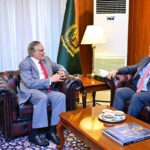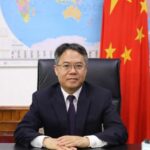ISLAMABAD, Feb 17 (APP): The Centre for Afghanistan, Middle East and Africa (CAMEA) at the Institute of Strategic Studies (ISSI), in collaboration with the Friedrich Ebert Stiftung (FES), hosted a one-day international conference on “Pakistan’s Strategic Frontiers: Adapting to Evolving Global Trends,” here on Friday.
Minister of State for Foreign Affairs Hina Rabbani Khar, Foreign Secretary of Pakistan Dr Asad Majeed Khan, Director General ISSI, Ambassador Sohail Mahmood, Director CAMEA Amina Khan and Dr Niels Hegewisch, Country Director FES spoke in the inaugural session, said a press release.
The conference was divided into three working sessions: Evolving Dynamics in Afghanistan; Evolving Situation in the Middle East; and Emerging Non-Traditional Security Threats in Afghanistan, Central Asia & the Middle East.
Hina Rabbani Khar, in her keynote video address, stated that Pakistan, owing to its geographical location, is placed at the center of evolving global power dynamics and increasingly complex interplay between traditional and nontraditional foreign policy actors.
She went on to say that globalization, interdependencies of economies and challenges of climate change and public health, water, energy and food security are compelling factors for win-win approaches. However, she regretted that Geopolitics continues to influence interstate relations.
She added that manipulation of interdependencies for geopolitics runs against the spirit of win-win cooperation that has been the hallmark of globalization for the last many decades and it is against the backdrop of these parallel global trends that Pakistan today has to define its interest.
Foreign Secretary Dr Asad Majeed Khan said the global transformations necessitate newer approaches for Pakistan. In the contemporary international politics, economic interdependencies, investment, trade, energy, connectivity are shapers and drivers of interstate relations.
He went on to say that, in parallel, we are witnessing new geopolitical contestations, competition for influence, resources and dominance in the domain of technology. Pakistan has to navigate similar competing trends and Pakistan’s location also keeps it at the flashpoint of conflict.
He also highlighted the country’s geo-economic pursuits and stated that China Pakistan Economic Corridor (CPEC) is an opportunity redefining regional connectivity. Polarization and power projection have only brought catastrophe and the world needs cooperation, and not confrontation. Furthermore, he said that Pakistan is committed to good relations with its neighbours.
DG ISSI Ambassador Sohail Mahmood highlighted the flux and uncertainty in the global environment. Specifically, he pointed to intensifying great-power competition, differences and disputes escalating into conflict and wars, food and fuel crises engulfing states big and small, a global pandemic manifesting itself in different variants, and a looming existential threat to mankind in the shape of climate change.
Sohail Mahmood underlined that a global order marked by cooperative multilateralism, commitment to UN Charter principles and international law, and strengthening of instruments for collaborative action was essential.
In the context of Pakistan, he stated that after long and hard reflection, it had come to the view that comprehensive security – that puts a premium above all on human security–was the paradigm that it must follow. It encompasses everything from food and health security to climate resilience and water security to population and migration as well as gender security.
“In essence, in the face of emerging global trends as well as all challenges and opportunities, Pakistan’s task is clearly cut out: i.e., to manage the complicated geo-politics and accentuate the pivot to geo-economics,” he concluded.
Amina Khan said that while these evolving global trends pose challenges at the same time and more importantly, they offer an array of opportunities, both economic and political, for Pakistan as well as the world at large. However, this will depend on how Pakistan takes charge and shapes its own future amidst these various scenarios.
Dr. Niels Hegewisch from FES stated that dialogue is the best way to achieve lasting peace. The world since 2021 has witnessed fundamental and unprecedented changes and is still changing rapidly and countries need to adapt.
He raised caution that there is no isolated place which is not affected by the decisions taken by countries miles away.






